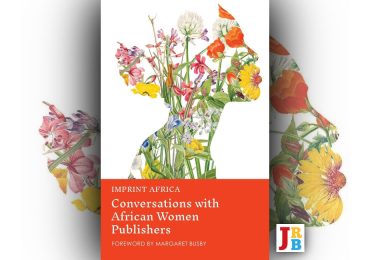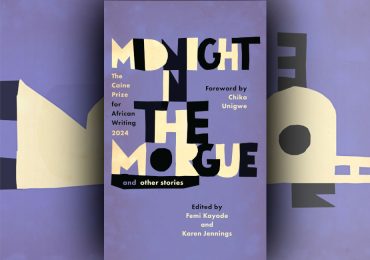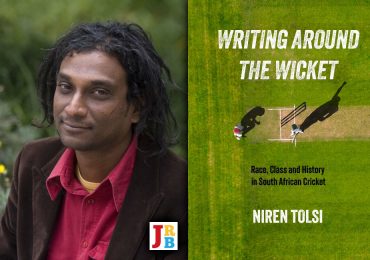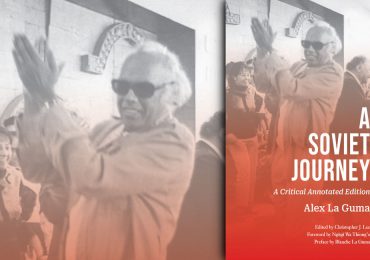Before I leave Johannesburg for Nairobi, Kenya, my friend and fellow author Zukiswa Wanner warns me not to bring more than forty copies of my books.
‘Comrade, those immigration officials will fine you forty-six per cent of the price of those books. You don’t want that to happen to you. Bring at the most twenty copies of Way Back Home and twenty copies of the new collection,’ she says on WhatsApp.
‘If they do catch you with forty copies you should at least say that you’re coming to donate the copies to a school or give to friends as gifts,’ she jokes. ‘Remember what happened to us in eSwatini?’
‘Okay. What school name can I use?’ I ask.
‘Comrade, you can Google.’
What Zukiswa doesn’t know is that I have already packed ninety books into my bag and backpack—twenty copies of Way Back Home and seventy copies of Soweto, Under the Apricot Tree. After my experience of running out of books to sell to book-hungry readers on our joint-launch tour in Zimbabwe recently, I’m pretty confident I can offload them all in Nairobi. I decide I’m going to ignore Zukiswa’s warning.
My flight is at half-past midnight. My friend Outlwile Tsipane picks me up at 7 pm, after the World Cup game between England and Sweden. Zukiswa has asked me to bring marshmallows for her son, H, and some red wine, so we need to stop off at the Pick n Pay. On our way to the shops I’m thinking about how these purchases and my ninety books are going to affect the weight of my bags at the airport.
I’m also thinking about that little incident in eSwatini, as we now call Swaziland, which happened to Zukiswa and I when we were visiting the BookHive book club in June this year. Along with our fellow scribes and friends Cynthia Jele, Angela Makholwa and Outlwile, we were ‘fined’ by immigration officers for travelling with hundreds of copies of our books, which we were planning to sell at our events at the Bahle Gallery and Ezulwini Wine Boutique in Mbabane. We ended up paying a two hundred rand bribe to the two officials before they would let us go.
At OR Tambo International Airport my fears are confirmed: I’m told that my bag exceeds the permitted 23 kg weight by 6 kg. The trick would be to transfer some of the books into three Pick n Pay plastic bags and take them as hand luggage. This is exactly what I do, and it works. By 10 pm I’m checked in and sitting at a coffee shop. The game between Russia and Croatia is in extra time and I’m having a few drinks, which I know will lull me to sleep during the four-and-a-half hour flight.
I sleep all the way to Nairobi, not even waking up for the early breakfast that is served on the plane. I regret this as soon as we land at Jomo Kenyatta International Airport at 6 am. After collecting my luggage, my anxiety about the possibility of being fined 46 per cent for carrying ninety books worsens my hunger. My stomach is rumbling.
A holder of a South African passport does not need a visa to visit Kenya. I learned this from my previous two visits to that country in 2005 and 2012. I have also read Hardly Working, Zukiswa’s memoir about travelling through East and Southern Africa. The book has given me strength and courage, as in it Zukiswa says that having a South African passport is a great advantage in these countries. I realise this is true when I show my passport to the immigration official, who is standing next to a long, winding queue of people filling in immigration forms.
‘You South Africans don’t need to fill in any papers,’ he tells me. ‘All you need is your yellow fever card and your passport.’ He directs me to another queue where there are a few Kenyan nationals standing.
I soon reach the front of the queue and hand over my documents, with the trepidation that accompanies bureaucracy. But the official simply stamps my passport with a smile on his face. He quickly checks a few pages and looks at me.
‘You travel a lot. Karibu Kenya.’
‘Thank you.’
He doesn’t even ask the usual questions about where I am going to be staying, how long I am going to be in Kenya, and so on. I breathe another sigh of relief when no one stops me to search my bag. I’m home free. Zukiswa and literary blogger James Murua are waiting for me outside. The sun is coming up slowly. We take a taxi to their home, which is in South B.
The reason I am in Kenya is to participate in Artistic Encounters, a literary project that Zukiswa curates at Nairobi’s Goethe-Institut. The project brings together two artists from different genres in front of an audience. The initiative is in its second year, and so far has featured artists from Kenya, Germany, South Africa, Sierra Leone, Nigeria, Zimbabwe, and The Gambia, including Victor Ehikhamenor, Koleka Putuma, Lola Shoneyin, Angela Makholwa, Pede Hollist, and many, many others. I’m to be featured with famous Kenyan actor Nick Ndeda, who will perform excerpts from my short story collection, Soweto, Under the Apricot Tree. At this moment no one knows what Nick has in store for us. The event will take place on the evening of 12 July, moderated by Zukiswa. I’m also booked for another event with the Text Book Centre Book Club on 14 July, a reading and discussion with Zukiswa, Hawa Jande Golakai and Yvonne Adhiambo Owuor. I have a couple of days before these events, so James and I indulge ourselves by sampling nyama choma and samaki and watching the World Cup at various bars around Nairobi.
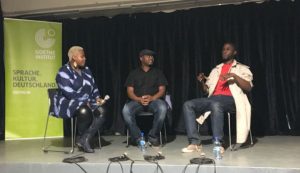
My Artistic Encounters event at the Goethe is packed. About a hundred people attend. Nick Ndeda gives a great one-man stage performance of three of my stories, ‘Roped In’, ‘Whistle-blowers and Vuvuzelas’ and ‘Private Dancer Saudade’. The recital lasts for about thirty minutes, and Nick gets a standing ovation. After the event, I sell about twenty-five of my ninety books.
What strikes me about the literary landscape in Kenya, is that besides Makena Onjerika winning the Caine Prize for African Writing this year, for her wonderful short story ‘Fanta Blackcurrant’, there has been no ‘big book news’ for the past five or six years. At least this is what I’m told by the writers, bloggers, aspirant writers and book readers I interact with. Some even tell me that the last major book to be published in Kenya was Yvonne Adhiambo Owuor’s Dust, back in 2014. There seems to be a consensus that most of the books being published in Kenya at the moment are motivational books. This is a serious concern for me, because when I was growing up I read and enjoyed a lot of great fiction by Kenyan authors, such as Meja Mwangi and Ngũgĩ wa Thiong’o. The good news is that Yvonne’s second book, The Dragonfly Sea, will be coming out in March next year, as she announces during our event at the Text Book Centre Book Club.

I end up selling sixty-two books during my Nairobi visit. But it’s not over yet. I was supposed to be leaving Kenya on 15 July, but Zukiswa and James suggest that we take a 3336 kilometre road trip from Nairobi to Harare, Zimbabwe. With the epic tales from Zukiswa’s Hardly Working running through my head, I agree, and we leave Nairobi for Arusha, Tanzania, on the morning of 16 July.
Our journey turns out to be 4459 kilometre long, precisely, as we meander through Tanzania, Zambia and Zimbabwe, and I sell many more books along the way. I’ll be writing about my trip over the next few issues of The JRB. Here’s to more borders and books.
- Niq Mhlongo is City Editor; his latest book is an anthology of short stories, Soweto, Under the Apricot Tree. Follow him on Twitter.


